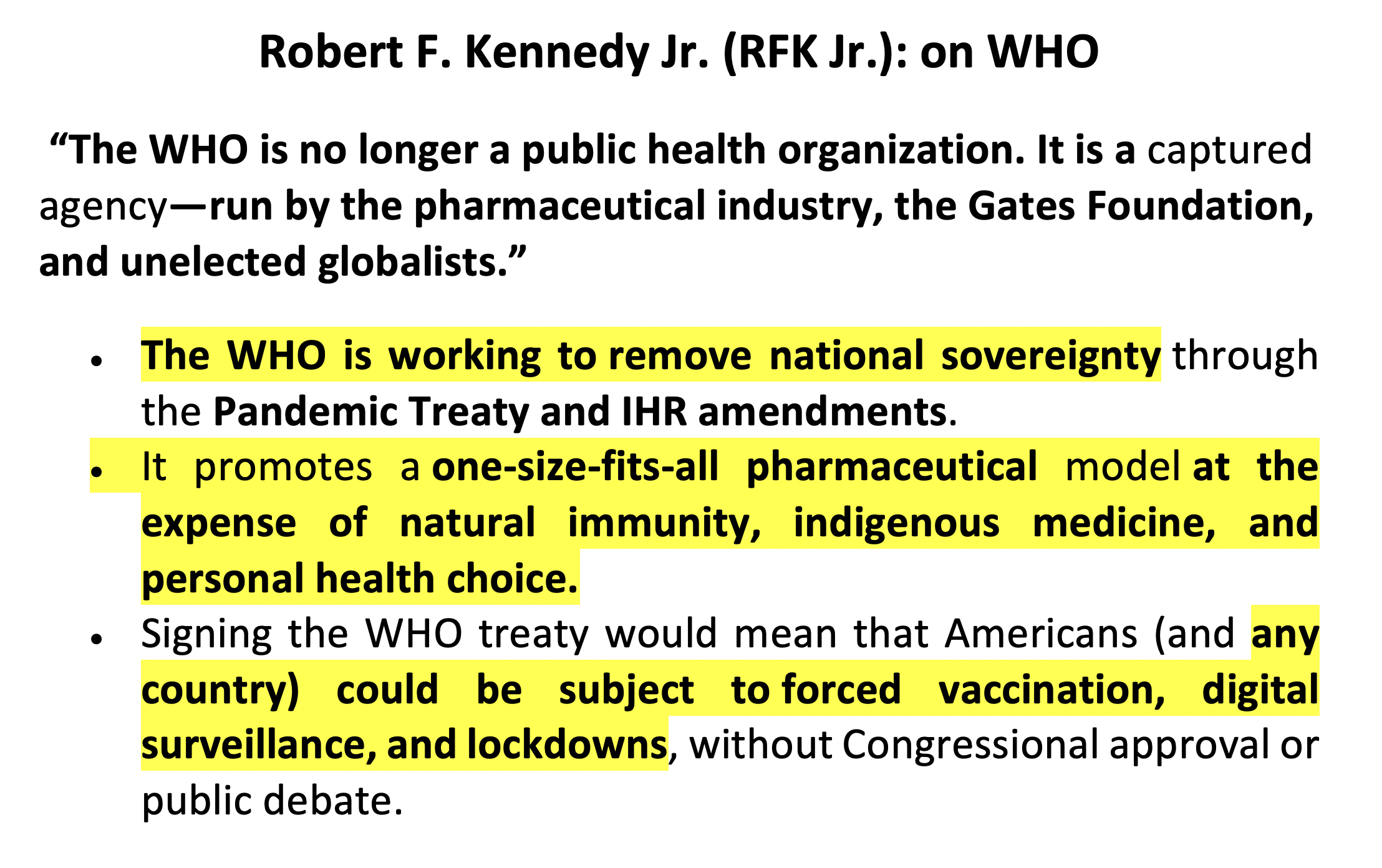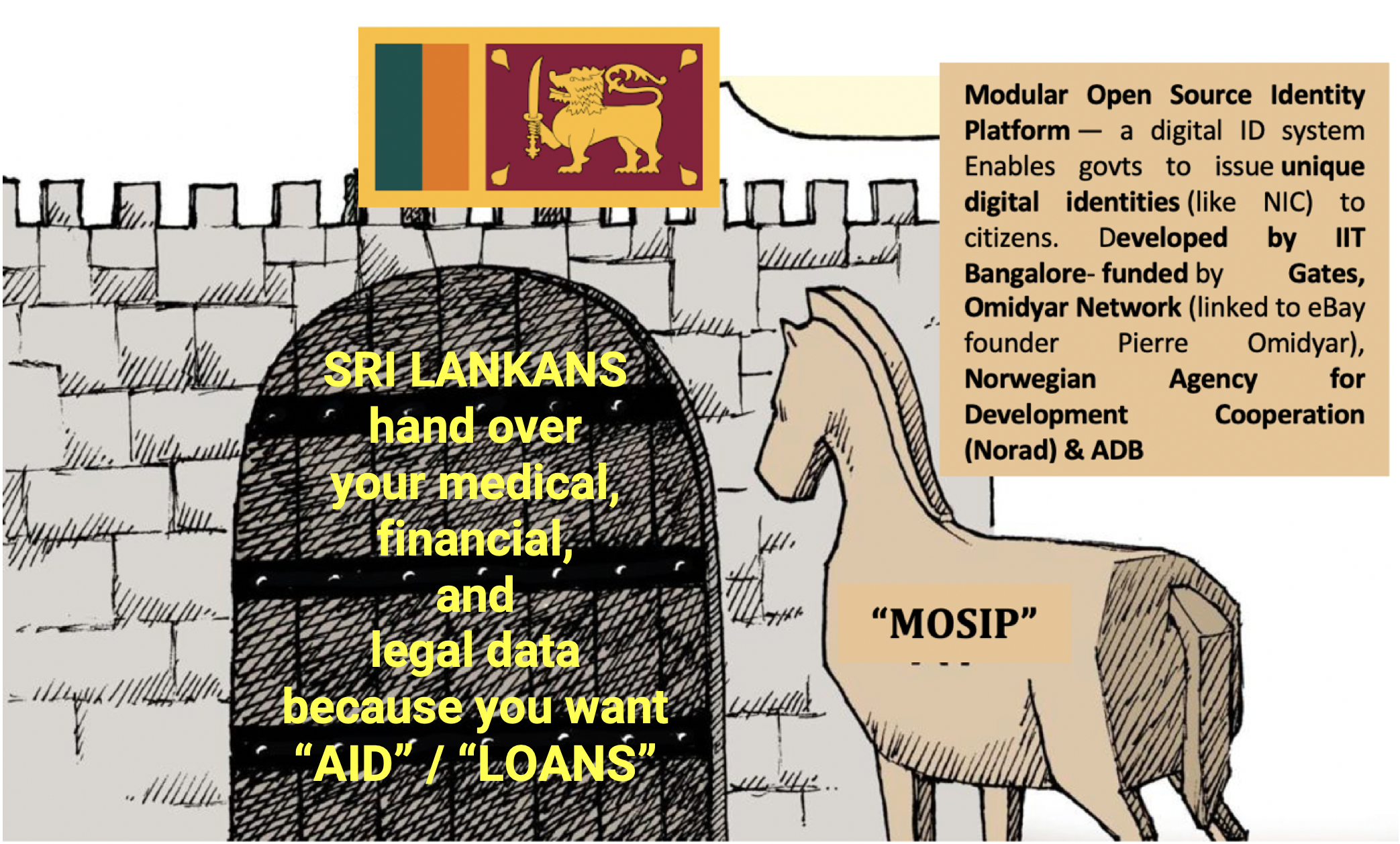URGENT APPEAL TO SRI LANKAN POLICY MAKERS: DO NOT SIGN THE INTERNATIONAL HEALTH REGULATIONS (IHR) AMENDMENTS!

The World Health Organization (WHO) is pushing for a Global Pandemic Treaty and amendments to the International Health Regulations (IHR) that would legally bind Sri Lanka to follow WHO directives—regardless of our national laws, culture, or people’s rights. The Sri Lankan government is blindly preparing to sign these dangerous agreements by the July 19 deadline. The GoSL is either unaware or do not care about the dangers involved in signing the IHR.
Possible scenarios if Sri Lanka signs
1. Forced Medical Interventions
- Citizens could becompelled to take vaccines or treatments mandated by WHO, even experimental or insufficiently tested ones. WHO is immune from accountability for fatalities.
- Theright to refuse treatment or choose traditional/native medicines likely to be removed.
2. Mandatory Lockdowns and Travel Bans
- The government would be required to imposelockdowns, curfews, and travel restrictions as dictated by WHO, even if they conflict with local needs or cause severe economic and social harm.
- No parliamentary approval or public consultationmight be required to enforce these measures.
3. Forced Quarantine and Isolation
- Individuals could beforcibly quarantined in designated facilities without due process or legal safeguards.
- Movement could be controlled and monitored extensively by the state on WHO orders.
4. Censorship and Suppression of Information
- Alternative health opinions and indigenous healing knowledge could bebanned or censored if they conflict with WHO’s narratives.
- Freedom of speech and scientific debate on public health matters could be curtailed.
5. Erosion of National Sovereignty
- Sri Lanka’sParliament and Constitution could be overridden by WHO mandates.
- Future governments will belegally bound to comply with WHO’s decisions, limiting democratic control.
6. Big Pharma Influence & Loss of Local Control
- Policies may prioritizepharmaceutical company interests over public health, resulting in costly and unnecessary medical interventions.
- Traditional and holistic medicines could be sidelined or criminalized.
The World Health Organization (WHO) presents itself as a neutral global health body, but in reality, it is heavily influenced—and partially controlled—by a small group of powerful state donors, private foundations, and corporate interests, particularly Big Pharma.
Who Really Controls the WHO?
1. Top Donors Drive Its Agenda
WHO’s funding comes from two main sources:
Assessed Contributions (from UN member states) – ~15%
These are fixed dues paid by countries based on income level.
Voluntary Contributions – ~85%
These come from governments, private foundations, and corporations—but they come with conditions and influence over how WHO uses the money.
The problem: He who pays, decides the policy.
2. The WHO’s Largest Donors (2022–2024)
| Donor | Influence |
| Germany | Largest state donor – over $1.4 billion |
| United States | Largest historical contributor |
| Bill & Melinda Gates Foundation (BMGF) | 2nd largest overall donor – $750+ million |
| GAVI Alliance (created by Bill Gates) | 3rd largest donor – vaccine-driven agenda |
| UK Government | Significant donor |
| Wellcome Trust | Private pharma-aligned funder |
| UNICEF, CEPI, Rotary, PATH | All vaccine-centric partners |
Combined, the Gates Foundation and its vaccine alliances (GAVI, CEPI) make up more than 20% of WHO’s total budget—giving them massive influence on global health policies.
3. Who really has a say in decisions?
WHO’s decisions are shaped by:
- Director-General: Dr. Tedros Adhanom Ghebreyesus — former Ethiopian politician backed by Gates-linked entities.
- Executive Board: 34 technically qualified members nominated by countries — but real direction often comes from donors, not democratic voting.
- Technical Advisory Groups: Often includeindividuals with ties to pharmaceutical companies, Gates Foundation, or Western research bodies.
In practice, WHO decisions are influenced by a handful of elite power centers, not by democratic representation:
· Gates Foundation
· Pharmaceutical corporations
· Wealthy donor nations (e.g., US, Germany, UK)
· Private-public vaccine alliances (GAVI, CEPI, PATH)
Bottom Line
WHO is not accountable to the people of Sri Lanka, or to any ordinary citizen.
It is financially and politically captured by entities who prioritize mass vaccination, pharmaceutical expansion, and global control mechanisms.
Signing any binding agreement with WHO—like the IHR amendments—is effectively handing over power to unelected billionaires, foreign governments, and corporations.
Dangerous Implications
- Violation of fundamental human rightsincluding bodily autonomy, freedom of movement, and freedom of expression.
- Permanent state of “public health emergency” could be declared arbitrarily, justifying ongoing restrictions and surveillance.
- Economic devastation from repeated lockdowns and travel bans with no local recourse.
- Loss of trust in government and international institutions.
- Permanent loss of healthcare sovereignty and cultural heritage in medicine.
Global Resistance is Growing — Sri Lanka must follow & not give up its sovereignty or place the lives of its citizens at risk.
Sri Lanka is not alone in rejecting this global health overreach:
- The United Stateshas formally begun withdrawing from WHO and will not sign the treaty.
- New Zealandhas publicly delayed signing to review implications carefully.
- Israel, Poland, Italy, Russia, Slovakia, Iran, Paraguay, and others abstained or expressed serious reservations and have not agreed to sign the IHR.
- Many nations and experts warn this treaty is aglobal health dictatorship in disguise.
An urgent call to the Sri Lankan Government
The government does not yet understand the full scale of the dangers it is agreeing to. Before signing:
- Conduct atransparent, public parliamentary debate with input from medical experts, traditional practitioners, legal experts, and civil society.
- Commission anindependent legal and constitutional review of the treaty and IHR amendments.
- Prioritizenational sovereignty, fundamental rights, and the health freedom of the people.
- Follow the example of countries thatrefuse to surrender their independence to an unelected global health bureaucracy.
To the People of Sri Lanka
Raise your voice! Demand transparency and accountability from your leaders. Protect your:
- Right to choose your medicine and reject forced vaccinations.
- Freedom to move, speak, and access diverse health information.
- Nation’s sovereignty and the legacy of our traditional healing systems.
This is a pivotal moment for Sri Lanka’s future.
We cannot afford to lose our freedom in the name of global health control.
Shenali D Waduge







